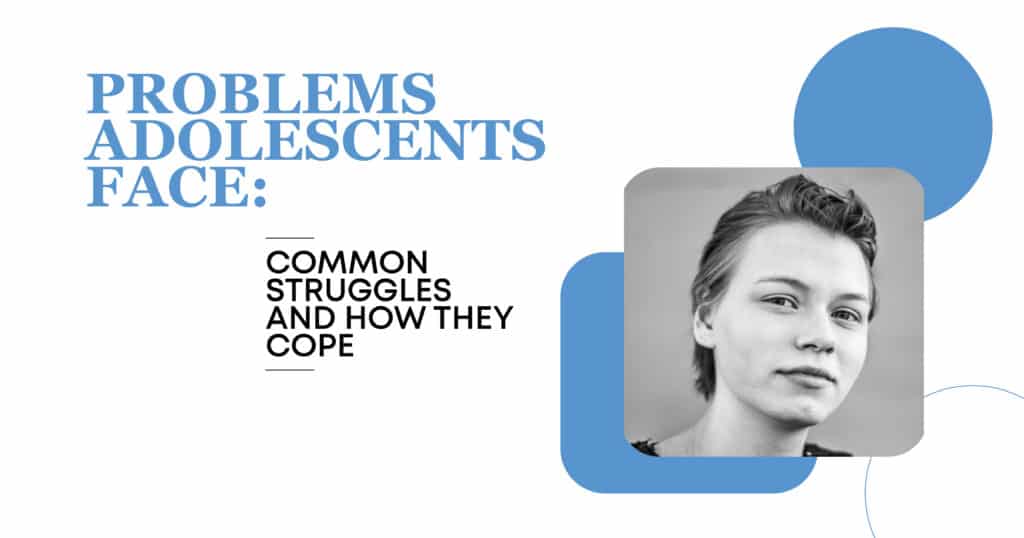During adolescence, individuals undergo profound changes. Teenagers who transition from childhood to adulthood experience multiple difficulties with emotional, social, academic, and mental health aspects.
Every teenager experiences their journey differently, yet numerous challenges affect many young people during this period. Modern problems adolescents face stem from both their internal development and outside forces, such as academic demands and social media dominance.
The support of parents, educators, and mental health professionals requires knowledge about adolescent issues because they need to guide young people during their essential life transition.
This article examines the current difficulties teenagers experience in real life together with their coping mechanisms and provides guidance on developing their emotional strength for future success.
The Real-World Problems Adolescents Face Today
Modern teenagers experience an exceptionally high level of pressure compared to previous generations. At an early stage, children must balance academic achievement with social connections and emotional growth with personal identity development while they navigate through an environment that constantly transforms.
The real-world challenges faced by contemporary teenagers require a deeper examination because their stressors extend across multiple domains. Modern adolescents receive numerous expectations from their schools and social environment and social networks about their identity and behavior standards.
The various messages that teens receive create conflicting messages, which make it hard for them to trust their instincts and be genuine.
The combination of social expectations to belong and succeed in school along with the need to plan for future success creates overwhelming stress for many teenagers. Teenagers encounter important problems which significantly affect their development into young adults.
Navigating the Emotional Weight of Growing Up
The process of maturing emotionally stands as one of the main issues which teenagers face. The adolescent years bring sudden hormonal shifts which create major changes in how teens feel and behave while affecting their mood patterns.
The body’s natural transformations become confusing and frightening for teens who lack the emotional language needed to understand these changes. Teenagers often experience feelings of being alone and confusion about their emotions, which they cannot fully grasp.
The emotional changes in physical development create challenges for many problems adolescents face with self-esteem and identity formation. During this time, young people start to wonder about their identity, personal values, and position in the world. The process of self-discovery brings benefits, yet it creates intense anxiety and insecurity for some individuals.
Teens who lack protected areas to investigate their questions might hide their emotions inside or express anger as a result of their frustration. The emotional swings that teenagers experience frequently become the main causes of mental health problems that frequently develop during adolescence.
Academic Pressure and the Race for Perfection
School success pressure stands as one of the main difficulties adolescents must overcome. Students face academic expectations alongside their responsibilities to maintain extracurricular activities and fulfill social commitments and plan their future path.
Students receive early messages which state that their academic performance along with standardized test results and college admissions outcomes, will shape their entire future. The pressure to succeed creates an environment where students view any misstep as a disaster and perfection stands as the only acceptable outcome.
Impact of Academic Pressure on Student Mental Health
Academic pressure causes severe damage to the mental health of students. School performance-related stress leads teens to experience chronic stress, sleep deprivation, and anxiety.
The fear of academic failure sometimes becomes so overwhelming that it results in students either burning out or completely disengaging from their studies. Students usually experience this pressure from within their own minds rather than from their teachers or parents.
Students who strive to excel in all activities experience feelings of worthlessness and defeat when they fail to meet their expectations. The academic difficulties that teenagers face today represent fundamental teen problems of the modern age, which help explain their current challenges.
Social Media, Self-Worth, and the Comparison Trap
Social media functions as one of the primary influential elements in the lives of teenagers during recent times. The social media platforms Instagram, Snapchat and TikTok provide teenagers with boundless chances to connect and create content, yet they help create some of the worst issues adolescents face today.
Teenagers on social media platforms spend their time comparing themselves to others, while they base their self-worth on the number of likes and followers they receive along with the comments they get. People rarely compare themselves to others on social media because these platforms display only the best moments from other people’s lives.
Harmful Effects of Social Media on Teen Mental Health
The repetitive viewing of carefully selected images and influencer life displays creates an unrealistic perception of reality for teenagers. Teenagers may start to think that all their peers lead better lives than they do.
The habit of comparing oneself to others leads to decreased self-worth, body image concerns, and feelings of personal failure. Social media functions as a platform where cyberbullying and public shaming occur, which makes it a leading cause of emotional and psychological problems during adolescence.
The challenges become more complicated because they occur through digital interfaces. Parents along with caregivers face challenges because they cannot observe the digital spaces where teenagers spend their time, thus they cannot step in until serious harm has occurred.
Peer Pressure and Identity Struggles in Teenage Life
The power of peer pressure during adolescence grew stronger because of social media and the development of highly connected friend networks. The current teenage generation experiences pressure to match group standards or perform dangerous actions to gain social approval.
The anxiety about being left out creates a strong influence which causes many young people to follow their peers, even when it means compromising their personal beliefs. During adolescence, people actively work to develop their identities. During adolescence, people discover their identity through their exploration of gender identity, as well as their religious beliefs, cultural background, personal values, and sexual orientation.
The process of self-discovery becomes powerful for teens until they must conceal aspects of themselves to gain acceptance from others, which produces inner turmoil and emotional suffering. Teenagers experience deeply personal issues which remain hidden from the rest of the world.
The struggle becomes even more intense for teens who feel different or marginalized. They may be discriminated against, bullied, or rejected for being who they really are. This makes it even harder for them to develop a strong and secure sense of self and adds to the already complex list of teen issues that affect how they experience the world.
Mental Health Challenges in Adolescents
The health of the mind stands as one of the most critical and least understood matters that adolescents experience. The number of teenage individuals experiencing anxiety, depression, and other mental health conditions has increased dramatically during the last few years.
The growing awareness about mental health has decreased some social prejudices, yet numerous teenagers remain without support. Many teenagers lack professional help and worry about receiving negative reactions when they seek help for their psychological issues.
Urgent Need to Recognize Hidden Teen Mental Health Struggles
Most mental health issues in teenagers remain hidden until they become severe enough to require immediate attention. During emotional development, adolescents often hide their psychological distress through irritability, withdrawal, and behavioral changes.
Parents often mistake their child’s behavioral changes for a normal development phase, although these actions frequently represent a need for support. The mental health issues affecting adolescents require immediate serious care along with empathy. The most common mental health issues among teenagers include anxiety disorders along with depressive episodes, eating disorders, and self-harming behaviors.
Teenagers who feel unable to escape their unmanageable situations may develop suicidal thoughts. These situations require immediate understanding, along with support and proper care access. Solutions that address adolescent problems in this area can save lives.
How Teens Cope: And When It’s Not Enough
Teenagers face numerous difficulties but demonstrate stronger resilience than most people recognize. Young people learn to develop coping strategies, which help them handle stress, emotional turmoil, and anxiety.
Teenagers use creative expression, conversations with trusted friends, sports activities and hobbies, and time alone as coping mechanisms. Healthy outlets enable teens to handle stress while discovering peaceful and clear moments in their chaotic lives.
Understanding Teen Struggles Beneath the Surface
Not every coping strategy works well or lasts long. Some teens use dangerous behaviors such as substance use, self-harm, or social withdrawal to escape their pain. Other teens may present an appearance of normalcy but experience deep emotional pain in secret.
The greatest difficulty when supporting teenagers is identifying when their current coping strategies fail them, so intervention with gentle care becomes necessary before their situation becomes unmanageable.
The process of coping differs from the process of healing. Some teens can handle stress healthily, but others need professional help to work through deeper issues. Most adolescent problems need personal growth, social support, and therapeutic intervention.
Helping Teens Build Emotional Resilience at Home
A healing environment can emerge from home when it establishes safety, love, and structure. Teens need to understand their worth exists beyond their accomplishments.
Teenagers require adults who listen without judgment, believe in their potential, and will accompany them through challenging times. Parents and caregivers help teenagers develop emotional resilience, which leads to their success.
Communication and Support in Guiding Teen Mental Health
Establishing open communication at home allows teenagers to express their thoughts and emotions freely. Young people will feel more comfortable opening up when they understand they can speak without facing punishment or dismissal.
Emotional intelligence should be demonstrated to teens because it teaches them effective stress management and healthy, appropriate help-seeking behaviors.
Supportive words hold great power. Teenagers achieve better results when they receive encouragement instead of criticism. Although we cannot eliminate all teenage problems, we can assist them through their challenges by giving them confidence and courage and showing them they have support.
Struggling Isn’t Failing: Hillside Horizon for Teens Is Here to Help
The path of adolescence brings many difficulties yet facing challenges does not indicate that a teenager is broken. The problems adolescents face are present chances for personal development and self-understanding, which lead to positive change when properly supported. Hillside Horizon for Teens understands the multifaceted nature of adolescent difficulties and solutions, so we provide professional support for teenagers who need guidance.
Our team understands the many layers of problems faced by teenagers, from mental health issues to identity struggles to academic burnout. We work with each teen individually, providing personalized care that addresses the root causes of their distress. We help teens reconnect with their strengths and rediscover their sense of purpose through therapy, community, and holistic support.
If you’ve noticed that your teen is struggling, or if you’re a teen yourself, and you’re feeling lost, please know this – there is help, hope, and people genuinely care.
FAQs
How does social media impact adolescent mental health?
Social media can intensify feelings of inadequacy, low self-worth, and anxiety by promoting unrealistic standards and constant comparison among peers.
What causes academic stress in teens?
Academic stress stems from high expectations, fear of failure, competitive environments, and the belief that one’s future depends entirely on current performance.
How can parents support their teen’s emotional well-being?
Parents can support their teens by fostering open communication, showing empathy, modeling emotional intelligence, and seeking professional help when necessary.
What are common mental health issues in adolescents?
Anxiety, depression, eating disorders, self-harm, and suicidal thoughts are among the most prevalent mental health concerns affecting teenagers today.
What strategies help teens cope with stress?
While some teens find relief in creative expression, friendships, or physical activity, others may need therapy or structured support to manage chronic stress effectively.




